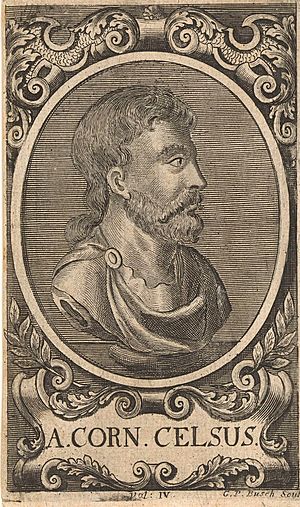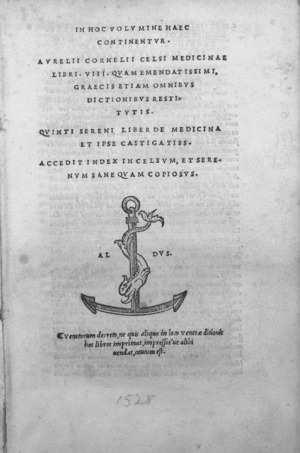Aulus Cornelius Celsus facts for kids
Quick facts for kids
Aulus Cornelius Celsus
|
|
|---|---|
 |
|
| Born | c. 25 BC |
| Died | c. 50 AD (aged roughly 75) |
| Occupation | Encyclopaedist |
Aulus Cornelius Celsus (c. 25 BC – c. 50 AD) was an important Roman writer. He was an encyclopaedist, which means he wrote large books covering many different topics. He is most famous for his medical book, De Medicina, which means "On Medicine."
This book is very special because it's the only part of his huge encyclopedia that has survived until today. De Medicina is a main source of information about diet, pharmacy, and surgery in the Roman world. It tells us a lot about medical knowledge from that time. Celsus's other writings, which are now lost, probably covered subjects like farming, law, and military skills. He also helped describe different human skin problems, and his name is still used in medical terms related to skin today.
Life of Celsus
We don't know much about Celsus's life. Even his first name is a bit uncertain, but "Aulus" is usually used. Some clues in his book De Medicina suggest he lived during the time of the Roman emperors Augustus and Tiberius. He also mentioned a Greek doctor named Themison as being old recently, which helps confirm when Celsus lived.
It's not certain where Celsus lived. Some think he might have lived in Rome. Others believe he lived in an area of Gaul (modern-day France) because he wrote about a type of vine that was common there.
It's also not clear if Celsus was a practicing doctor himself. Even though he described medical observations and treatments, another Roman writer, Quintilian, said Celsus's books covered all sorts of subjects, including farming and military strategies.
Celsus's Writings
De Medicina: On Medicine
Celsus wrote many books for his encyclopedia, but only his famous medical book, On Medicine (De Medicina), is still complete. This work is organized into eight books, following the way medicine was divided at the time: diet, medicines, and surgery.
Here's what each book covers:
- Book 1 – The History of Medicine (it mentions many doctors, some only known through this book!)
- Book 2 – General Sicknesses
- Book 3 – Specific Diseases
- Book 4 – Parts of the Body
- Book 5 and 6 – Medicines and how to use them
- Book 7 – Surgery
- Book 8 – Orthopedics (dealing with bones and joints)
In the introduction to De Medicina, Celsus discussed how doctors learned about the body. He talked about the importance of both medical theories and practical experience. He also mentioned early discussions about how doctors gained knowledge, including through observation.
When treating sickness, Celsus mainly focused on observing and supporting the body's natural healing process. He believed that fever was the body's way of fighting off illness. He thought that if left alone, the body would usually get better. However, he also bravely suggested using the scalpel (a surgical knife) when needed. His rules for blood letting and using purgatives (medicines to clear the bowels) were very detailed. Many of his medical rules were still used even in the early 1800s.
His book describes the symptoms and different types of fever in detail. Celsus is also famous for describing the four main signs of inflammation: calor (warmth), dolor (pain), tumor (swelling), and rubor (redness). These are still known as the "Celsus tetrad of inflammation."
Celsus also wrote about many Roman surgical procedures from the 1st century. These included removing cataracts from the eye, treating bladder stones, and setting broken bones.
He wrote about the eye's anatomy and was the first to call one of its layers the choroid. The Greek doctor Hippocrates used the word karkínos (meaning 'crab') to describe harmful tumors. It was Celsus who translated this Greek term into the Latin word cancer, which also means 'crab'.
The first printed version of Celsus's work was published in 1478. His writing style is highly admired for its clear and elegant language.
On Agriculture
Celsus also wrote a technical book about farming. Another Roman writer named Columella used Celsus's work as a basis for his own book on agriculture, De Re Rustica.
See also
 In Spanish: Aulo Cornelio Celso para niños
In Spanish: Aulo Cornelio Celso para niños
 | Kyle Baker |
 | Joseph Yoakum |
 | Laura Wheeler Waring |
 | Henry Ossawa Tanner |


